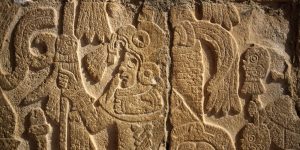Over the years there have been several adaptations regarding the biblical story of Noah’s Ark, whether the comedy film starring Steve Carell, or a film narrating the Bible story. However, the adaptation that the majority of people do not recognize is the Bible story itself. The story of Noah and his ark was actually adapted from the eleventh and twelfth tablets of the Epic of Gilgamesh. The Epic of Gilgamesh is an epic poem that narrates the adventures of a fictional hero named Gilgamesh.1 The reason that Noah’s Ark is an adaptation is due to the many parallels between the two stories. Some similarities include the wrath of a deity upon humankind, as well as the creation of a type of vessel in order to survive the flood.
Before the 19th century, the Bible was believed to be the most credible source of historical information about the Ancient Near East. However,“The Epic of Gilgamesh is the oldest surviving epic poem in history, dating from about 2500 B.C.E.”2 The discovery of the Epic of Gilgamesh, specifically the tablets containing the excerpts detailing the Great Flood myth, caused turmoil among the ancient historical community, due to the fact that the Great Flood myth was written about a thousand years before the Bible story of Noah.3

The eleventh tablet narrates one of Gilgamesh’s adventures in search for immortality.4 Yet his search leads him to a wise man named Utnapishtim. Utnapishtim then reveals to Gilgamesh how he achieved immortality. He begins to explain how the god Ea informed him of the devastating flood created by the gods in order to extinguish humanity. He was instructed to construct a boat of immense size and to tell the people of Shuruppak to assist him in the building of the boat. Once the boat was complete, he was to load it with every living thing and his family in order to survive. Seven days later the great flood began its reign of destruction upon humankind. During this time, Utnapishtim and his ark ran aground on a mountain peak. He then released a dove in order to find land but the dove returned, not having found land. The same thing happened when he sends a swallow. However, the third time he releases a raven that never returned. Upon reaching land, the gods in heaven realized the great service Utnapishtim had done by saving humankind; thus, they granted him and his wife eternal life.
Much like the Epic of Gilgamesh, the story of Noah’s Ark conveys a similar destruction tale.5 The book of Genesis narrates how God began to despair over the creation of humankind due to humanity becoming sinful and evil. Therefore, God decided to create an immense flood in order to destroy and cleanse the world. However, God chose a man named Noah due to his immaculate behavior, and He instructed him to build a boat or an ark. Once he completed the ark, he was to load it with a pair of every animal on earth along with his family. For the next forty days, God plunged the earth with devastating rains, causing the earth to be flooded for a whole year. Noah then released a dove and it never returned, meaning that it had found dry land. Once the water receded, the earth was restored and became once again fertile. God made a covenant with Noah promising that his lineage will be fertile and that he will never destroy humanity again by flood.
The parallels between both stories are clear to see, due to the similarity in content and story structure. For example, both narratives include an extremely powerful deity or deities, that form a plan to wipe out humankind by creating a great flood in order to restore the earth, as well as how a single man was chosen by a higher power to save humanity.6 Another parallel is how both individuals were instructed to construct a boat in order to survive the coming flood. The content of both vessels is also similar due to them being loaded with all the living things on earth, even though in the Epic of Gilgamesh it was all living things while in Noah it was the pair of every animal on earth, along with their families. Once the earth was flooded, both Utnapishtim and Noah release birds in order to find out if the land was yet dry. Finally, both men upon reaching land are rewarded by higher powers, due to their involvement in saving humanity, and the creation of a new world.
- Benjamin R. Foster, Douglas Frayne, and Gary M. Beckman, The epic of Gilgamesh: a new translation, analogues, criticism (New York: Norton, 2001), 60-65. ↵
- Jerry Bentley, Herbert Ziegler, Heather Streets Salter, Traditions & Encounters: A Brief Global History Volume 1 (New York, NY: McGraw-Hill Publishers, 2016), 17. ↵
- James B. Pritchard, Ancient Near Eastern texts relating to the Old Testament (Princeton, N.J.: Princeton University Press, 1969), 3. ↵
- Pritchard, Ancient Near Eastern texts, 273. ↵
- Jerry Pinkney, Noah’s ark (New York : SeaStar Books, 2002), 20-30. ↵
- Pritchard, Ancient Near Eastern texts, 10. ↵



110 comments
Samuel Sanchez
This was an amazing article. I did not know that Noah’s Ark was a derived from the Epic of Gilgamesh. But after the background of the Epic it seems really interesting and very similar to Noah’s Ark. Since the epic of Gilgamesh came first it is the original story. Very informative comparing the two stories. Keep up the good work.
Zaraly Frasquillo
Wow, you left me speechless. This is such a good article and the topic is AMAZING! I had never heard about the Epic of Gilgamish, let alone about the eleventh tablet. I had learned about the different versions of the story of Noah, but all of my life I had thought that he was the original. You did a great job making your readers wanting more and more!
Alyssa Valdez
Wow! I found this article very interesting and informative, I have never heard of the epic of Gilgamesh! I am sure that your article might have a lot of controversy considering that the Epic of Gilgamesh and the bible’s Noah’s ark are so similar. Amazing job, tying these two stories together, I believe your article flowed very smoothly and was very organized!
Ana Gonzalez
Great job! This a well written article and in my opinion, it flows nicely from paragraph to paragraph. You did a nice job of explaining the story of Gilgamesh and then comparing it to bible’s story of Noah’s ark. It’s crazy how these two stories were written by different people in different societies with different beliefs and yet the stories are almost identical. Great Article !
Marissa Gonzalez
I was never really familiar with the Epic of Gilgamesh since I always heard about the biblical story of Noah’s Ark. Well done drawing together the parallels of both stories very clearly. I found it very interesting that the Epic of Gilgamesh was written before the Noah and the flood. Since I was not familiar with the Epic of Gilgamesh, it was very surprising to me that it was written way before what was indicated in the bible and how close the similarities are. But I also learned from your article that there are different background meanings behind it. For example, God promised Noah that He would not flood the earth again because the time He did it was to cleanse it. Very good research!
Jennifer Pogue
Very informative article. I grew up constantly hearing the story of Noah’s Ark. The epic of Gilgamesh was never mentioned. It is fascinating how similar they are. You did a great job of comparting both stories. I wonder how civilizations years apart and possibly in different locations have almost identical stories. Your writing was very easy to understand and fun to read. Great job!
Cesar Zavala
Amazing how these two historical scripts were written hundreds of years apart and yet they are still very similar if not identical. Nice mention on Steve Carell’s movie on this very story, one of my favorite movies growing up! And I also want to mention that an architect created a replica of Noah’s Ark not too long ago and that might have been a good picture to put in this article. Well written article!
Gabriela Serrato
The comparison of the two stories was very well represented. I was always under the impression that the story of Noah was original and its own but it is interesting to see how another tale was very similar. I was actually in disbelief to see that both stories had exact similarities, and even more so when many believe that the Bible is “the most credible source of historical information.”
Natalia Zuniga
Growing up hearing about this story and getting to the point where there is very nothing left to find out I was interested in your approach to this topic. That was amazing to hear of this story whether or not the Bible took from it not it great to see the story existing in other cultures and how similar they can be.
Steven Clinton
Who would have thought a story like Noah’s Ark would be similar to another. As Catholic always hear about Noah’s ark and never about the poem of Gilgamesh. It’s interesting to see how the epic Poem of Gilgamesh predates Noak’s Ark. Maybe the plot of Gilgamesh influenced and inspired the creation of Noah’s Ark. Overall I think the article was great.